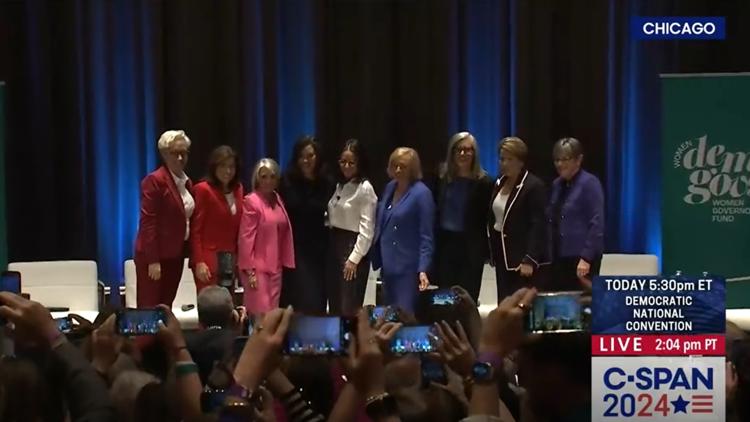PORTLAND, Ore. — Oregon Governor Tina Kotek appeared in Chicago on Tuesday for a lively panel discussion coinciding with the 2024 Democratic National Convention, hosted by "Seinfeld" and "Veep" star Julia Louis-Dreyfus.
The panel was put on by the Democratic Governors Association, bringing together all eight women governors elected from the party; including Michigan Gov. Gretchen Whitmer, New York Gov. Kathy Hochul and Arizona Gov. Katie Hobbs.
Kotek whiffed on the introductory question, when Louis-Dreyfus quizzed each of the assembled governors on whether they knew their state flowers.
"I don't, but the state bird is the meadowlark," Kotek offered ruefully.
Oregon's state flower, for the uninitiated, is a relatively deep cut — the Oregon grape, or hollyleaved barberry. Like the latter name implies, it's a bush with holly-shaped leaves that produces clusters of small blue fruits, like a grape or blueberry. In the spring, it blooms with small yellow flowers.
Each of the other governors named their state flower aside from Whitmer, who joked that Michigan's state flower is the "orange barrel."
"Did you make that up?" asked Maine Gov. Janet Mills.
"That's what we say! I'm fixin' the damn roads, Janet," Whitmer quipped (Michigan's state flower is the apple blossom).
From there, the discussion got down to more serious matters. Much of it focused on the governors in battleground states or those with Republican-held legislatures, where the Democratic women have had an uphill battle in passing policy — or even in preventing policy they oppose from passing. They touched on abortion, building consensus, election security and women in politics, among other topics.
But Kotek was featured in one direct question from Louis-Dreyfus, hearkening back to the governor's time as the longest-tenured Oregon House speaker.
"I'm guessing you had to tell a lot of men what to do ... that must have been fun," Louis-Dreyfus said dryly. "Can I apply for a position like that?"
"Sometimes, men like to be led; it's okay," Kotek said to scattered laughter.
"Can you recall the first time you were the only woman in the room or the only person in a decision-making setting, and what was that realization like?" Louis-Dreyfus asked.
"Oh, lots of those moments — first, when I became speaker," Kotek said. "All of the other leadership at the time was male, and you notice when you're the only one in the room ... I felt like everyday people weren't in the room except for me."
"Oh, really?" Louis-Dreyfus asked.
"People who were like, 'What do the women think about this?' You're having this lovely conversation, but what does it mean for real people?" Kotek continued. "And I think that we've all experienced that a little bit, being the women in the room. And the good thing is we've changed that. My caucus leaders, we now have another woman speaker — I mean, things have changed, and it takes all of us.
"Your earlier question about (women in down-ballot positions) and the pipeline, what I think we've all realized is, 'I need a few more women in this room.' And we're doing it every single day by modeling best behavior and showing what is possible, and getting more women in the room. But you definitely feel that sense of, there are people out here who matter, and this isn't a game. And I think that women get that more than the men do sometimes."



